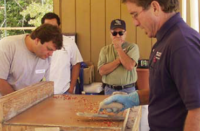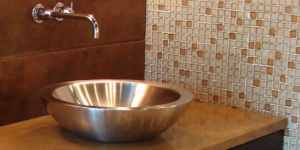Getting started in concrete fabrication can be overwhelming. Here are 10 solid pieces of advice that veterans from across the country have for artisans who are setting up shop:
Think about how you can minimize labor. Stock plenty of tools, store them close by and replace them after each use. Think about how a task can be completed by one worker instead of two. Outsource work if you can. Workers will save time, accomplish more and in turn affect the bottom line of your business.
Keep your overhead low. If you’re just starting out, don’t buy more tools or equipment than you need, and buy used as long as it doesn’t mean sacrificing quality. Save money on rent by avoiding the most expensive part of town.
Conceptualize your design up front and make it modifiable. When designing your space, keep in mind that you’ll likely make changes in the future to accommodate the direction your business takes. Emphasizing mobility and flexibility in your design will save you hassles down the road.
Give your potential customers easy access to your work. Have a showroom that clients can visit. It’s also a good idea to allow them into your work space, since many value seeing the works you have in progress.
Section off each area of your work space to keep dust and other airborne particles from spreading. This not only prevents your pieces from being damaged or ruined, but it saves time. Instead of cleaning sawdust off the floor before beginning the next step of a project, you can transfer the piece to another area and move right along.
Consider the types of projects you plan to work on while planning your space. If large pieces are in your future, you’ll need the space for them, and if the sizes of your pieces will run the gamut, make your space flexible. For example, build tables that can be cut down or pieced together in different ways for different-sized projects. Use tables on wheels so they can be moved out of the way to clear floor space when needed.
Have a good business plan. Don’t let the actual work get in the way of your business’ success. “You need to hire people to do the actual work so you can focus on running your business,” Fox says. “It’s so labor-intensive, and you don’t want to waste a week working on a piece when you could have been out there marketing and selling.” Adds French, “This is a very difficult industry to make a living in. You need to plan well from the beginning – that will determine how successful you’ll be.”
Establish a protocol for each project and stick to it. Following a predetermined plan, which includes necessary paperwork for each project and the path it takes through your work space, will increase work productivity in your shop by miles.
Keep your shop organized and clean. Not only will your shop be a more pleasant place to work in, but you’ll eliminate the time you would have spent searching for tools and cleaning up stubborn messes (and in the long run, accomplish more).
Choose a location based on your budget and needs. For countertop artisans with a slim budget, an inexpensive rental space in an industrial neighborhood will do just fine. But if you have more money to spend and plan to make your shop a place for impressing potential clients, a more central location may be for you.















